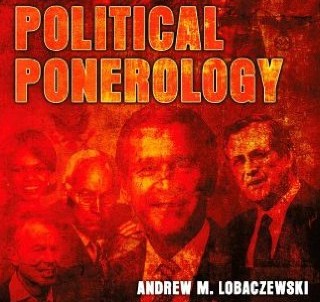By Mary W Maxwell, PhD, LLB
This is a review of two books:
“Political Ponerology,” written in Poland in 1984 by Andrew Lobaczewski, and “The Cunning of History,” written by Rabbi Richard L Rubenstein in the US in 1975. I will also refer to “The Ethnic Phenomenon,” by Pierre van den Berghe (1980).
We are living in sad times. Maybe that has always been true. I myself am a happy citizen, having never been subjected to horrific treatment, but I do see many people suffering. I also see ecological damage occurring, some of which is being done “for the sake of it,” as amazing as that may be. Why would anyone commit such evil?
Three Possibilities
One can imagine three simple explanations. First, the evil done by a person could be an offshoot of something else that is not particularly evil. For example, ordinary greed can cause A to deprive B of all his resources. Call this “incidental evil.”
Second, the evil-doer may have been taught that his line of ‘work’ is good and that he is acting properly by fulfilling this duty. He may have been brought up in a family or community that proudly practices the evil deeds. May as well call this “indoctrinated evil.” (It could include devil-worship, which is growing in popularity!)
Thirdly – and this is the thesis of the ponerology book – a certain percentage of persons are psychopaths. Call this “pathology-based evil.” They lack a conscience, and can go about hurting others without restraint. They may take delight in it (in which case we call them sadists) or they may just advance their own careers as normal folks do, but by employing their special sick-o behaviors.
I have often noticed that any individual who can lie shamelessly, can “get away with murder.” Onlookers are generally unwilling to cry “Liar!” — as we have been taught that people are NOT evil. Thus, a lack of conscience can help some persons succeed. They not only lack built-in restraint; they lack the restraint that should be provided by neighbors’ anger, but isn’t!
It is worth noticing, per Lobaczewski’s book, “Political Ponerology,” that the word “psychopath” is underutilized. Within a family, decades often elapse before the victims put two and two together and realize that the offending family member is not just erring due to circumstance, but is on a mission to hurt them. (Of course there’s also great reluctance to admit that a family member is that bad.)
Psychopaths in Power
Both authors, Lobaczewski, who suffered under Soviet rule, and Rubenstein, whose book is a comment on the Nazi Holocaust, were cogitating on how a nation can do evil things at the behest of evil rulers. Thus we are not interested, for purposes of this review, in the psychopathy that would make a person hurt his, or her, family members.
We will look only at persons in power, for example, leaders of nations. Note: I shall sequester ‘international evil’ to a place at the end of this review, as I consider the cruel treatment of one’s enemy to be a separate phenomenon from cruel treatment dished out within the community.
Adolf Hitler (1889-1945) and his minions, it was said, exterminated the Jews of Europe — at least those who were not desired for slave labor. Josef Stalin (1878-1953) ruled the USSR until his death.
Under both rulers, the public lived in fear, while any poor souls who were arrested had to endure whatever tortures their captors could think to inflict. In Germany this took place in a professedly Christian culture.
We know things today about Hitler and Stalin that differ from what these 1975 and 1984 authors knew, but I won’t make that corrective update here. Using the facts that Lobaczewski and Rubenstein thought were solid facts, what is their explanation for what happened?
What the Rabbi Saw
Having briefly stated that the Polish author (and the two colleagues with whom he produced his work) concentrated on psychopathology and antisocial behavior, I will say that the rabbi in Connecticut, Richard L Rubenstein, theorized that the problem was a loss of the sacred.
Thus, for Rubenstein, the Holocaust can best be explained by – in a word – secularization. I’ll quote him, at page 91 of “The Cunning of History”:
“In the beginning, secularization involved the demystification and the limitations of the sovereign’s power. In the end the secular state has dethroned all mystification of power and morality save its own. The state becomes the only true god on earth with the power to define realistically what is good. [It also has] the ultimate power of divinity, the power to decide who will live and who will die.” [Emphasis added]
Personally I give Rubenstein’s idea chronological priority, since the group of cruel leaders we are analyzing is modern. These Bozos require that a state exist, in the manner just described, so they can ascend to the ready-made office of state-leader. They need a secular culture in which they can get away with whatever it is they “need” to do. I quote Rubenstein again, at page 91:
“If it is no crime for a state to exterminate its citizens…it is also no crime for them to inflict upon them the kind of slavery the Nazis inflicted on the camp inmates. [I add: or the Chinese prisons today, where men work two shifts of hard labor.] Both the Nazis and the Bolsheviks under Stalin have demonstrated that a properly organized modern state can inflict total domination upon any segment of its population it chooses.” [Emphasis added]
“The Modern Era”
Look to Robert Burns, in his “A Man’s a Man for A’ That”
(1795), for a radical statement of the requisite demystification of the ruler:
Ye see yon birkie, ca’d a lord,
Wha struts, an’ stares, an’ a’ that;
Tho’ hundreds worship at his word,
He’s but a coof for a’ that:
For a’ that, an’ a’ that,
His ribband, star, an’ a’ that:
The man o’ independent mind
He looks an’ laughs at a’ that.
Don’t worry, I’m not here to knock secularism or the coming of political equality (such as it be). But note this: in modernity’s early stage, say in 1517 when Luther posted his theses at Wittenberg, the plan was merely to correct some of the behaviors of the sacred religion, not do away with it. But one thing leads to another. Full demystification is now our portion.
From there, the state does indeed tend to fill the vacuum (no doubt this is helped by our natural tribal leanings). We automatically think that what the state is doing is right. Perforce, if your name is Barack Obama, or Malcolm Turnbull, you may be able to get your office to decree just about anything. Yes, even in a democracy. (See?)
Missingness, and Intergroup Aggression
I haven’t quite captured Rubenstein’s theory of the Holocaust.
The most important part of it is not what is there (in a society’s worldview), but what is missing. Allow me to compare this to a theory of inter-ethnic cruelty developed by the anthropologist Pierre van ben Berghe, a Belgian immigrant to the US and an early expositor of sociobiology.
His 1980 book, “The Ethnic Phenomenon,” investigates several genocides. He finds intergroup cruelty to be the norm, if some other factors are present, notably a struggle for resources. Yet he does not deduce that people evolved to be cruel. Rather he says – and I think he is right – that foreigners are not included under one’s “umbrella of altruism.”
Van den Berghe knows that we have, as mammals, fundamental selfishness. We are able to overcome it to help relatives. We can, and regularly do, constrain our behaviors, such as our grabbiness. This restraint is under subconscious, instinctive control. We also extend this umbrella of altruism to all members of our group, more or less. But there’s no such instinct to help us deal charitably with strangers.
In a manner somewhat similar to van den Berghe’s, Rubenstein says (on page 42 of “The Cunning of History”):
“The [Nazi] death camps were the end product of a very long cultural and political development involving all of the major countries of the Western world rather than the product of the specialized and extraordinary hatred of the Germans for the Jews…. The record of the British, Dutch, Portuguese, French, and Spanish in Africa, Asia, and the Americas, is quantitatively as bloodstained as that of the Germans.”
Conclusion
No doubt Andrew Lobaczewski, in “Political Ponerology,” is right to believe that we should be alert to the role played by psychopathy. Individuals without a conscience (maybe 2 percent of the population?) have advantages when trying to climb the ladder of success in business and government. Their lack of remorse when they cause suffering can help them get ahead.
As for Rubenstein’s book, it says we have gone too far in demystifying religion and nation and haven’t sufficiently noticed the way we gave the state a godlike status. Rubenstein thinks it is reprehensible for “enlightened” persons, who believe – or claim to believe – in rule of law, to hold back mightily from subjecting office-holders to law.
Van den Berghe holds that, when one ethnic group has an all-out bash with another group, it is not necessary to look to the bashers’ cruel nature. I do agree with van den Berghe’s main thesis: that our instinctive umbrella of altruism does not extend to strangers and that this explains much cruelty. But I also think we are positively given to cruelty, to a foreign group.
In war, we take pride in the harm we do to an enemy. Naturally. We – males especially – relish the body count.
In general I recommend that we consider, as a quite distinct part of human nature, our instinct for group competition.
Then we are better placed to do what Lobaczewski and Rubenstein are importantly doing – forcing us to account for the cruelty that a leader inflicts on his/her own nation.
Also we ought to make more of the type of evil that I characterized above as “indoctrinated evil.” It may explain the devil-worship set. It possibly guides the so-called Illuminati and, if you believe Brice Taylor and other MK-Ultra victims, it is dutifully practiced by the Bush family.
Let’s not shy away from discussing any vital matter today, even if it sounds silly or embarrassing.
— Mary Maxwell is a devotee of sociobiology. Her 1990 book “Morality among Nations: an Evolutionary View” compares various theories of international relations. None of the theories of that time, a quarter century ago, spoke of the rapid shift to a global rulership. On this, see her “Prosecution for Treason; Epidemics, Weather Wars, Mind Control, and the Surrender of Sovereignty” (2011).
































The full Monty
https://www.youtube.com/watch?v=KkxpqHqV3aY
Want to see total surrealism? See this.
http://www.bulletinleader.com/university-unveils-sculpture-of-youngest-marathon-victim/101969/.
A University has named its Social Justice Institute after the
8-year old boy who was killed at the Boston Marathon.
I repeat: s-o-c-i-a-l j-u-s-t-i-c-e.
[…] is a sequel to my September 28, 2015 article entitled “Are Humans Evil? If So, Why?” It covered the psychopathic type that Andrew Lobaczewski has written about. He says: you can […]
[…] is a sequel to my September 28, 2015 article entitled “Are Humans Evil? If So, Why?” It covered the psychopathic type that Andrew Lobaczewski has written about. He says: you can […]